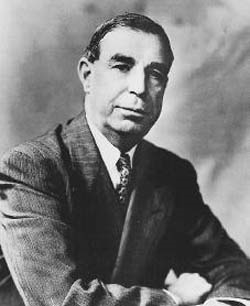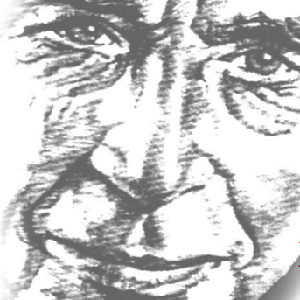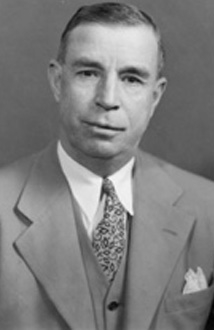 |
| Senator Chavez (notablebiographies.com) |
Fond of proclaiming he was "American before Plymouth Rock," Dennis Chavez traced his roots in the New World to a 17th century Spanish land grant. The Son of David and Paz Sénchez, Dionisio, "Dennis," Chavez was born on April 8, 1888, in the rural community of Los Chévez. In 1895, David moved his family of eight children to the Barelas community near Albuquerque. Dennis worked driving a grocery wagon at the age of 13 to help support the family.
Despite leaving school, he continued his education after work at the city library, studying engineering and American history and politics. Thomas Jefferson was tremendous influence on Dennis' education. His self-taught engineering skills enabled him to become a surveyor and later assistant to the Albuquerque city engineer.
Gaining the attention of Senator A.A. Jones, Dennis acted as a Spanish interpreter throughout the senator's 1916 campaign. He moved to Washington D.C. to work on the senator's staff following the election. Through the encouragement and support of Jones, Dennis was accepted at Georgetown University Law School after passing a special examination for admittance.
Receiving his degree in 1920, Dennis returned to Albuquerque, opened a law practice and became active in local politics. Jefferson's political philosophy influenced Dennis' own personal belief in placing human rights over property rights.
In 1922, Dennis was elected to the state House of Representatives, serving one term and sponsoring his first reform legislation ? free text books for public school children. Voters then elected him to the U.S. House of Representatives in 1930 and 1932.
During his years in the lower House, Dennis served New Mexico's interests through sponsoring legislation that continues to benefit the state. Examples of his project sponsorship include reclamation projects affecting the Elephant Butte Dam Project and the Carlsbad Irrigation Project. In 1932, he was appointed chairman of the Indian Affairs Committee and in 1933 sponsored a bill authorizing compensatory payments of $750,000 to New Mexico Pueblo Indians for misappropriated lands.
 |
| (Dennis Chavez Foundation) |
In 1935, following the death of Senator Bronson Cutting, Dennis was appointed by Governor Clyde Tingley to fill the vacancy. He handily won election to the office the following year, serving in the Senate until his death in 1962.
Throughout his Senate career, Dennis was concerned with the development of resources in the West. He actively supported measures such as water and soil conservation programs, transportation, federal crop insurance, and most importantly for New Mexico, rural electrification. Beginning in 1937, he introduced the first of many bills to protect Indian lands, citizenship, voting rights and self determination. Throughout the 1940s and 1950s, he advocated national education measures.
On the international level, Dennis supported America's entry into the North Atlantic Treaty Organization (NATO). As the only Spanish-speaking senator, he worked closely with U.S. Secretary of State Cordell Hull on forming the Good Neighbor Policy for Latin America. He was particularly effective as President Roosevelt's personal emissary on the planning and development of the Pan American Highway. He became so involved with Puerto Rican problems that he was dubbed "Puerto Rico's Senator."
As a lifelong advocate of civil rights, he co-sponsored one of the first Senate bills to prohibit discrimination in employment. This bill, introduced in 1944, called the Fair Employment Practices Commission Bill, would prohibit discrimination based on race, religion, color, national origin or ancestry. Until the 1964 Civil Rights Bill, however, these rights remained unprotected.
At the height of anti-Communist sentiment in the 1950s, Dennis was among the first to denounce the tactics of Senator Joseph McCarthy of Wisconsin. He frequently called on the Senate to return to "decency, sanity and the basic principles of due process."
At his death, he was fourth ranking in seniority and chairman of the Senate Subcommittee on Defense Appropriations and Public Works. He died in Washington on November 18, 1962, of a heart attack and was buried in Albuquerque three days later with Vice President Lyndon B. Johnson providing the eulogy. He was survived by his wife, Imelda Espinosa (1890-1980), whom he married on November 9, 1911, and their three children.
 |
| (google images) |
The many honors bestowed upon "El Senador" include the dedication in 1966 of the Chavez statue in the Capitol's Statuary Hall in Washington. Dennis is the only New Mexican to be so honored. On April 3, 1991, the U.S. Postal Service recognized the senator with a stamp issued in the Great American Series. This stamp acknowledges his lifelong contributions.
As Johnson stated in his eulogy, "Chavez was a man who recognized that there must be a champions for the least among us."
Page created on 8/1/2014 3:44:13 PM
Last edited 1/4/2017 11:42:53 PM

Haz clic aquí para leer la historia sobre Dennis Chávez en español